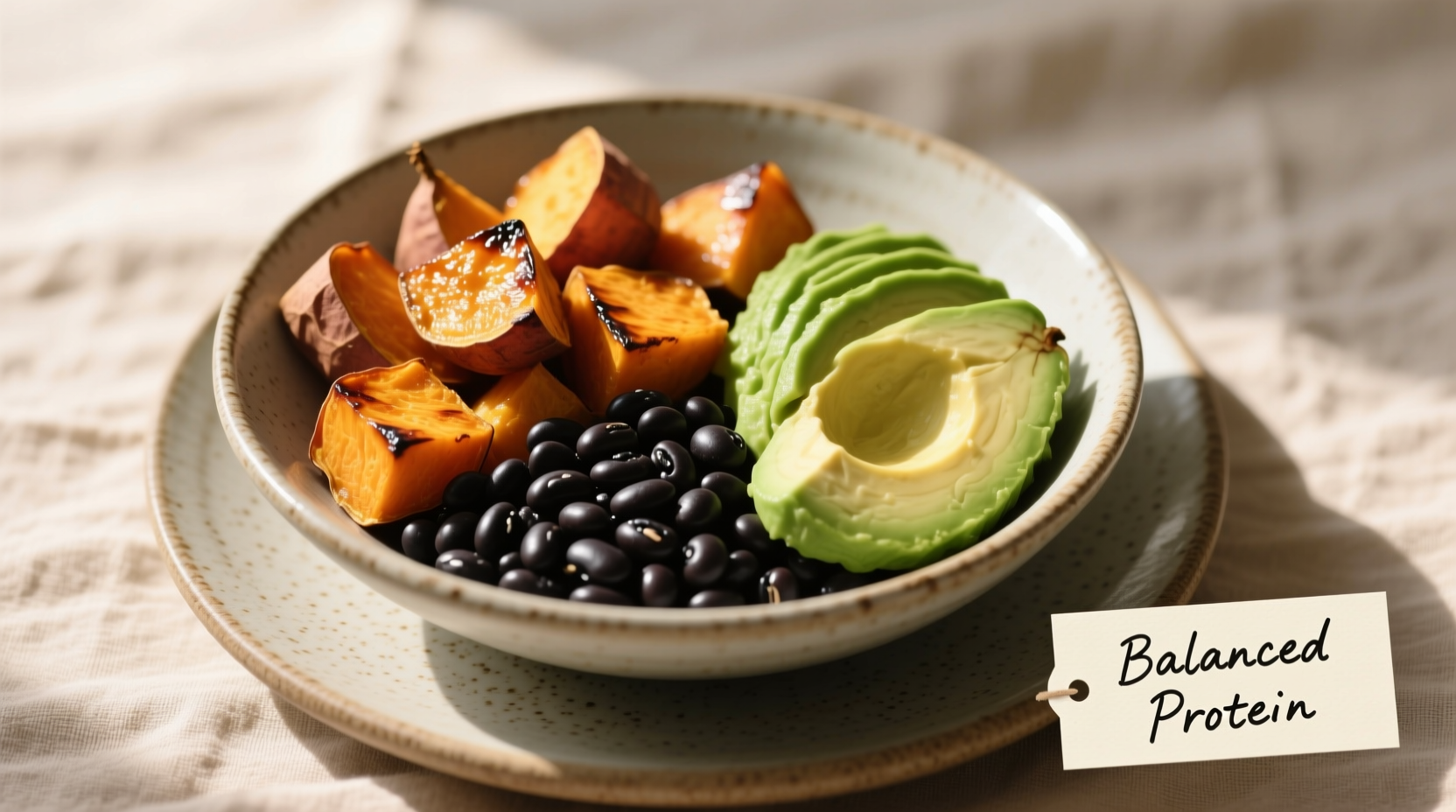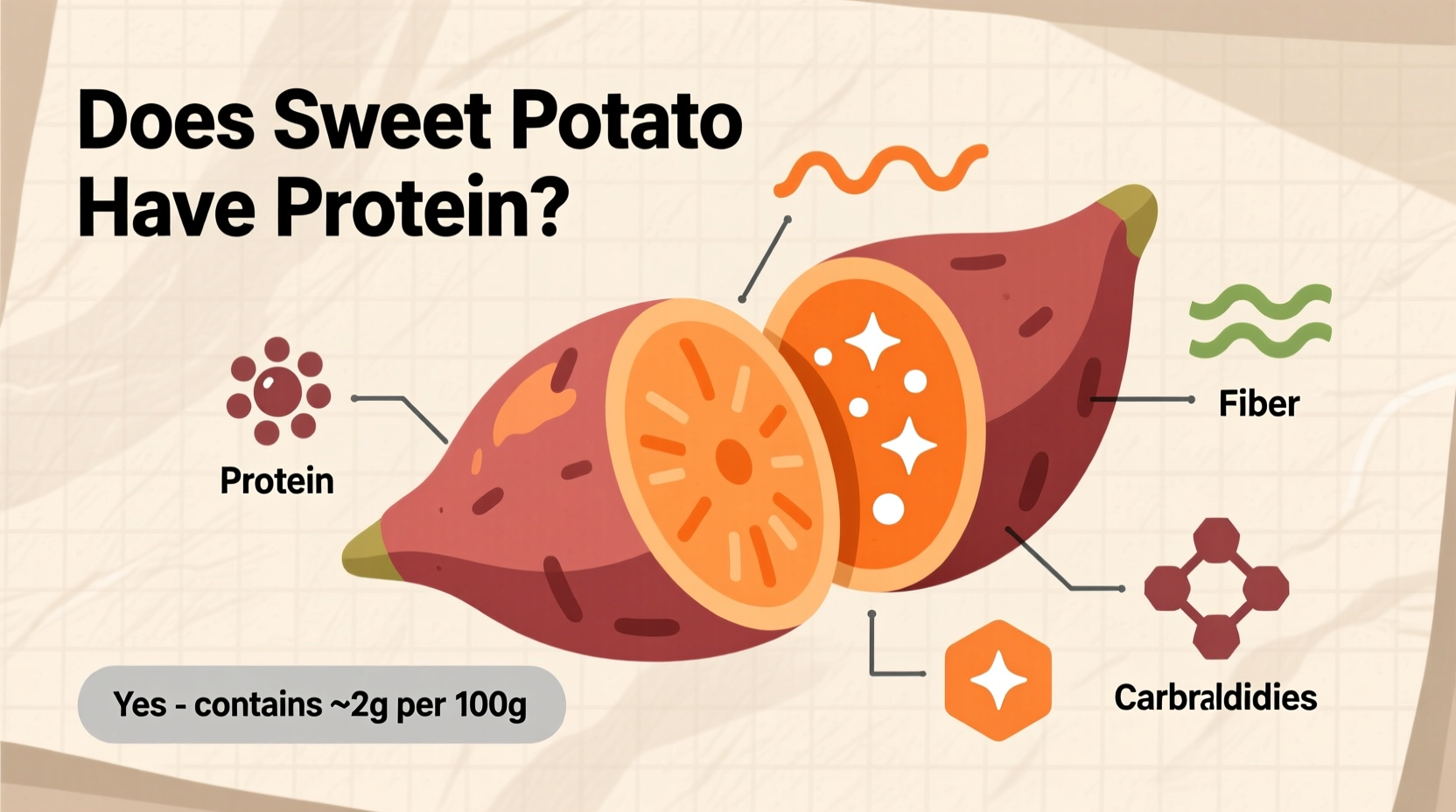Immediate Answer: Protein Content Demystified
You'll get a clear, science-backed answer within seconds: sweet potatoes do contain protein, but they're not a primary protein source. According to USDA FoodData Central, raw sweet potatoes provide 1.57 grams of protein per 100 grams. For context, that's about 2 grams in a medium sweet potato (130g)—roughly 4% of your daily protein needs. This root vegetable shines brightest as a nutrient-dense carb source with valuable complementary protein.
Nutritional Profile Breakdown
Beyond protein, sweet potatoes deliver exceptional nutritional value. One medium sweet potato packs 103 calories, 24g carbohydrates (including 3.8g fiber), and a staggering 438% of your daily vitamin A needs. Their protein contribution becomes strategically valuable when understood within this complete nutritional picture.
| Food (100g) | Protein (g) | Key Nutrients |
|---|---|---|
| Sweet potato (raw) | 1.57 | Vitamin A, Vitamin C, Fiber |
| Black beans (cooked) | 8.9 | Fiber, Iron, Folate |
| Chicken breast (cooked) | 31 | Niacin, Selenium, B6 |
| Tofu (firm) | 17 | Calcium, Iron, Magnesium |
Source: USDA FoodData Central (2023)
Context Boundaries: When Sweet Potatoes Shine as Protein Partners
Sweet potatoes aren't complete proteins—they lack sufficient lysine and methionine. However, they excel in strategic protein pairing. When combined with legumes (like black beans), they form complete proteins through amino acid complementation. This makes them particularly valuable in plant-based diets. Note these critical boundaries:
- Not for protein-focused meals: Don't rely on sweet potatoes alone for protein needs
- Best as carb-protein hybrids: Ideal in balanced meals with 20-30g total protein
- Processing matters: Baking preserves protein better than boiling (which leaches nutrients)
Maximizing Protein Benefits: Practical Pairing Strategies
Transform sweet potatoes from side dishes to protein-boosting powerhouses with these chef-tested techniques:
- The 1:2 Ratio: Pair one medium sweet potato with 3oz chicken or 1 cup black beans for 15g+ protein
- Breakfast Upgrade: Mash sweet potato into oatmeal with Greek yogurt (adds 10g protein)
- Post-Workout Combo: Sweet potato toast topped with almond butter and hemp seeds

Why This Matters for Your Diet
While sweet potatoes won't replace your protein shakes, their 2g contribution per serving provides meaningful support. For active adults, every gram counts toward the NIH-recommended 0.8g protein per kg of body weight. More importantly, they deliver this protein alongside complex carbs and fiber—creating sustained energy release unlike isolated protein sources. This synergy makes them superior to processed carb alternatives when building balanced meals.
Frequently Asked Questions
How much protein is in one sweet potato?
A medium sweet potato (130g) contains approximately 2 grams of protein. This represents about 4% of the daily protein requirement for an average adult, making it a modest but valuable contributor when combined with other protein sources.
Are sweet potatoes a good protein source for vegetarians?
Sweet potatoes alone aren't sufficient, but they're excellent when paired with legumes. Combining one sweet potato with half a cup of black beans creates a complete protein profile through amino acid complementation, providing about 10g of balanced protein.
Does cooking method affect sweet potato protein content?
Yes—baking preserves more protein than boiling. Water-based cooking leaches nutrients into the water, potentially reducing protein content by 10-15%. For maximum protein retention, bake or roast sweet potatoes with the skin on.
Can sweet potatoes help with muscle recovery?
Indirectly, yes. While not high in protein, their complex carbohydrates replenish glycogen stores after exercise. When paired with 20-30g of complete protein (like chicken or tofu), they create the ideal post-workout meal for muscle recovery and growth.











 浙公网安备
33010002000092号
浙公网安备
33010002000092号 浙B2-20120091-4
浙B2-20120091-4